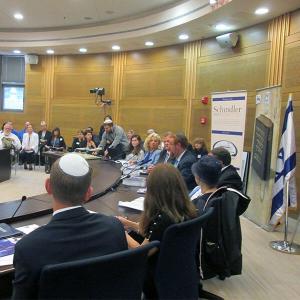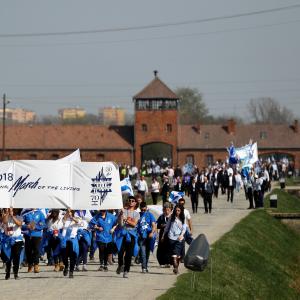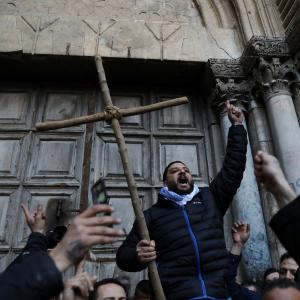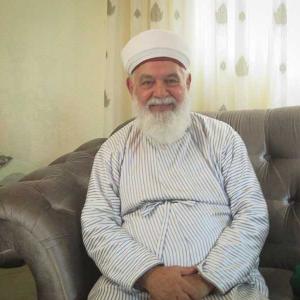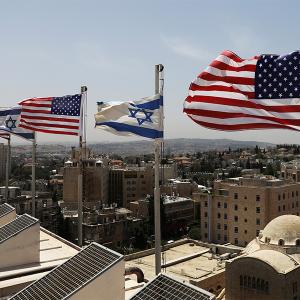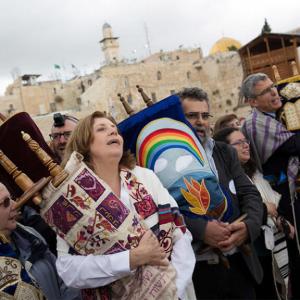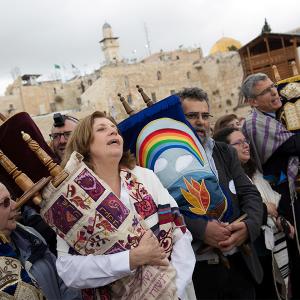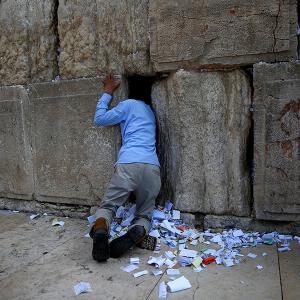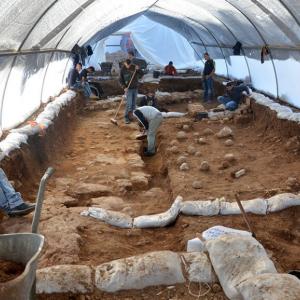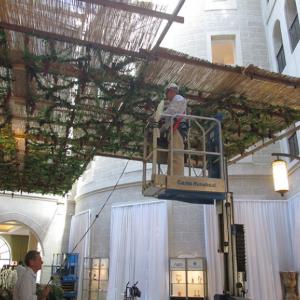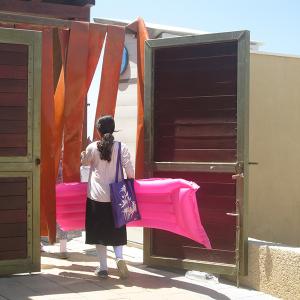Michele Chabin writes for Religion News Service.
Posts By This Author
For Some, U.S. Embassy’s Move to Jerusalem Fulfills Divine Prophecy
“For evangelical Christians the embassy move is part of eschatology,” the expectation of what will transpire at the end of times,” explained Rabbi David Rosen, director of the American Jewish Committee’s Department of Interreligious Affairs. “The return of the Jewish people to their ancestral homeland and the reestablishment of Jewish sovereignty in Jerusalem is seen as a stage ultimately leading to the full messianic era.”
At Auschwitz, Thousands Join the March of the Living to Honor the Dead
“Being here made me realize how important my Judaism is. I’m a link in a long chain that the Holocaust tried to break. People my age are the future.”
Experts Seek to Educate Young Arabs About the Holocaust to Combat Anti-Semitism
“There are hundreds of web pages of Holocaust denial” in the Arab world “but almost nothing in Arabic that combats this denial,” Saadoun said. “We’re teaching Arabs about their own history.”
Jerusalem Tax Spat Pits Heaven Against Earth
“It is absurd for Jerusalem residents to fund municipal services for the churches … on their own, and for the municipality to be prevented from collecting enormous sums that could significantly improve the city’s development and services,” Barkat said.
Neither Muslim nor Jew: Samaritans in the Middle East
“The Muslims see us as Jews and the Jews see us as fanatics. They’re wary of us. It’s difficult."
Trump Trip to Middle East, Vatican Offers Religious Opportunities and Pitfalls
There is concern that Trump’s team will be too even-handed and that he and his advisers lack understanding of the region. On Monday a senior U.S. Consulate official coordinating Trump’s visit told Israeli counterparts that the Western Wall is “not your territory. It’s part of the West Bank.” The wall is in East Jerusalem.
Some Rabbis Fear Expanding Women’s Roles in the Israeli Army Could Lead to Sin
A year and a half after joining the Air Force, Ofir is halfway through her stint as a flight simulator instructor. Despite the rigors of military life she continues to keep kosher and observe the Sabbath.
Ofir is one of a growing number of Orthodox Jewish women who see no contradiction between serving in the military and maintaining a religious lifestyle – a trend that some Israeli rabbis hope to end.
Orthodox High School Girls Bused to Western Wall to Drown Out Feminist Prayers
An Orthodox Jewish organization opposed to female-led prayers at the Western Wall bused in between 1,000 and 2,000 Orthodox high school girls to prevent a feminist group from praying.
Liba, an organization whose goal is to prevent pluralistic prayer at the holy site, instructed the girls to fill up the women’s section so the feminist group, Women of the Wall, could not enter to perform their monthly prayer on Feb. 27.
Why Can't Women Pray at the Western Wall?
If the High Court ultimately rules that women can read Torah in the women’s section of the Western Wall, ultra-Orthodox lawmakers in the Israeli Parliament may try to pass legislation to criminalize the practice, not only at the traditional wall but also at Robinson’s Arch.
Donald Trump Writes a Prayer for Western Wall Crevices
Hoping for divine intervention – or Jewish votes – Donald Trump wrote a short prayer to be inserted in between the stones of the Western Wall.
Trump’s team photographed and sent a copy of the handwritten prayer to Ynet News and Yedioth Ahronoth, Israeli sister publications. The original was handed to David Faiman, a Trump advisor, who was heading to Israel, the news outlets reported.
Site Where Romans Breached Jerusalem Walls Is Pinpointed
The site where, nearly 2,000 years ago, the Roman army breached the outer walls of ancient Jerusalem, before capturing the city and destroying the Second Jewish Temple, has been discovered, the Israel Antiquities Authority says.
Archaeologists made the discovery last winter, during an exploratory survey at a future construction site, the IAA said on Oct. 20.
Why Israel's Waldorf Astoria Is Designed for Sukkot
When architects planned the Waldorf Astoria Hotel Jerusalem, they designed it with the Jewish holiday of Sukkot, or Feast of Tabernacles, in mind.
The hotel has an atrium with a retractable roof, as well as large, unobstructed patios to accommodate sukkahs, temporary structures Jews are commanded to dwell in during the holiday. In Israel the holiday, which began on Oct. 16, is observed for seven days, everywhere else for eight.
In Israel, Women-Only Beach Days Allow the Religious to Relax
While some European beaches are banning women dressed in “burkinis” and other modest swimwear, and Americans are challenging women’s-only swimming hours at public pools, this Israeli beach has long been a haven for women whose strict religious beliefs, community norms or fears of sexual harassment, among other reasons, make swimming or sunbathing alongside men undesirable, even impossible.
In Israel, Followers of Different Religions Help Each Other Keep the Faith

Image via Michele Chabin / RNS
Stuart Levy, a nurse at a Jerusalem hospital, updates his ward’s work schedule several times a week, with staffers’ vacations, birthdays and more religious holidays than many people know exist.
“We have 18 hospital beds, and on any given day we may have an Orthodox Jew next to a devout Muslim next to a Catholic next to a Druze next to a Russian Orthodox patient,” said Levy, head nurse of the oncology/hematology ward at Hadassah Medical Center-Ein Kerem. “And many of our staff are religiously observant.”
A Bible You Can Wear on Your Heart, Sleeve, or Lapel
Bentov, a combat video journalist who was sent out to cover wars and terror attacks, said he developed the Jerusalem Nano Bible “as a way to generate some positive change in the world.”
“For a long time I felt the need to create something that would help fight the evil and the ugliness I witnessed all around me,” he said. “I wanted to leave something good for my kids and the next generations to come.”
Palestinian Authority Limits Christmas Celebrations in West Bank
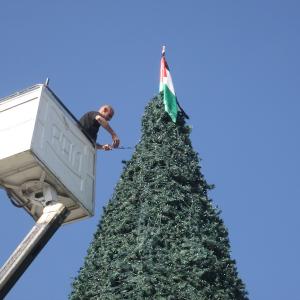
Image via Michele Chabin / RNS
The Palestinian Authority has asked municipalities to tone down their public Christmas celebrations this year amid escalating violence between Palestinians and Israelis.
Hana Amireh, who heads a government committee on churches in the West Bank, confirmed the Palestinian Authority is requesting “a certain decrease” in festivities following the deaths of dozens of Palestinians since mid-September. The majority of them were killed during clashes with Israeli forces or carrying out terrorist attacks, according to the Israeli government.
Amireh said the government has asked the municipality of Bethlehem, the town where Jesus was born and where official Palestinian celebrations of Christmas take place, not to set off holiday fireworks this year and to limit the festive lights and decorations that traditionally adorn the town to two main streets.
Netanyahu Prohibits Israeli Parliament From Visiting Temple Mount
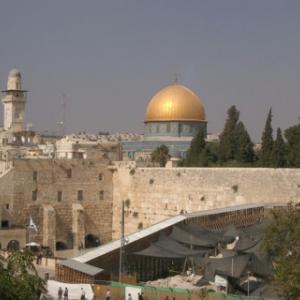
Image via Jabeen Bhatti / RNS
In a bid to defuse the wave of Palestinian violence that has struck Israel and the West Bank during the past few weeks, Israeli Prime Minister Benjamin Netanyahu on Oct. 8 prohibited all of the country’s parliamentarians from visiting the Temple Mount, a contentious site holy to both Jews and Arabs.
Netanyahu made the controversial decision in order to quell Muslims’ fears that Israel was preparing to assert sovereignty over part or all of the Mount, the site of the Al-Aqsa Mosque and Dome of the Rock, and the long-destroyed Jewish Biblical Temples. Netanyahu has long denied such intentions.
Far-right-wing Jews, including Israeli agricultural minister Uri Ariel, say Jews should have the right to pray at Judaism’s holy site, and some have vowed to build a Third Jewish Temple on the Temple Mount. Arab leaders, including Palestinian President Mahmoud Abbas, have said such a move would result in a regional war against Israel.
Overlapping Holidays Prompt Jerusalem Activists to Work on Overcoming Divisions
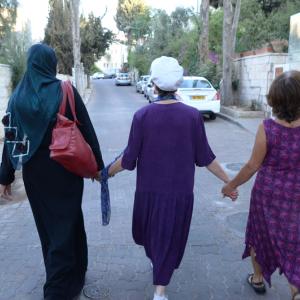
Image via The Abrahamic Reunion/RNS
An interfaith group gathered in a private home Sept. 21 to head off potential tensions over how Jews and Muslims celebrate Yom Kippur and Eid al-Adha, two holidays that overlap this year.
The meeting of the Abrahamic Reunion took on added significance in Jerusalem, where more than a week of violent clashes between Israelis and Palestinians on the Temple Mount have spilled into the streets of East Jerusalem.
Two dozen people of various faiths heard a rabbi explain the laws and traditions of Yom Kippur, the Jewish Day of Atonement, and a Muslim sheikh explain the laws and traditions of Eid al-Adha, the Muslim holiday that honors the willingness of Ibrahim (the biblical Abraham) to heed God’s order to sacrifice his son.
The day culminated with an interfaith peace walk between the eastern and western parts of the city. Israel captured East Jerusalem in 1967 and considers it part of its capital. The Palestinians say East Jerusalem must be the capital of a future Palestinian state.
Orthodox and Secular Jews Fight Over Shaping Jerusalem's Character
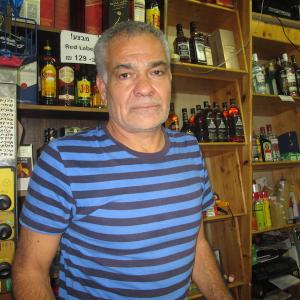
Yossi Cohen. Image via Michele Chabin/RNS
Yossi Cohen was shocked when city inspectors warned him last month to close his downtown convenience store during the Jewish Sabbath or else be socked with fines.
“For 20 years I’ve been open during Shabbat (the Hebrew for Sabbath) and suddenly the city decides I have to close?” said Cohen, one of eight convenience store owners ordered to shut down from sundown Friday until Saturday night.
“The message is clear: The municipality doesn’t want non-religious people in this city.”
The closure order, which faces a court hearing Sept. 16, was part of a compromise that Jerusalem Mayor Nir Barkat recently struck with ultra-Orthodox city council members who threatened to block a movie multiplex from opening on the Sabbath in a secular part of the city unless the convenience stores were shut on the Sabbath.
Israeli Christian Schools Strike to Protest Cuts in Public Funding
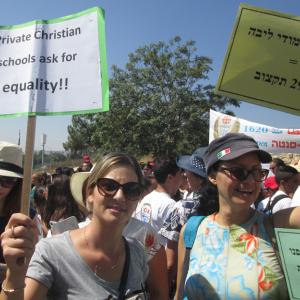
Image via Michele Chabin/RNS
Israel’s 47 Christian schools are entering the second week of an open-ended strike to protest ongoing cuts in government allocations, which they attribute to government discrimination against minority religious groups.
The schools, 40 of them Catholic, teach 33,000 Christian and Muslim Arab students in central and northern Israel.
Officials from various Christian denominations called the strike on Aug. 31, after nearly two years of negotiations with the Ministry of Education failed to convince the government to reinstate the funding it has withdrawn from the country’s semi-private schools during the past six years.
